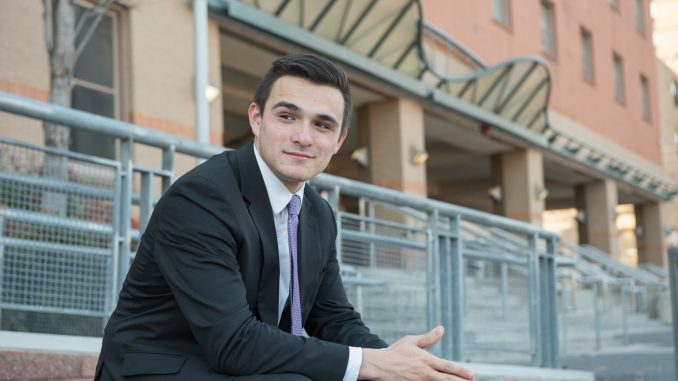
A student is creating a proposal to add on-campus recovery housing as a housing option for students.
George Basile, a former member of Temple Student Government’s Parliament, proposed the recovery housing bill to TSG’s legislative branch in March. Since Parliament’s unanimous approval of the bill, which called for an “exploration” of the housing option, Basile has networked with possible donors to fund the program. Donors and donor amounts will be finalized depending if his proposal is successful among university officials.
He expects to reach a goal of $100,000 of investment promises from donors before proposing it to university officials.
“We’re in the long haul for this one,” he said. “I don’t see this being an extremely expedient process, but I do believe it’s an important one.”
University officials are reaching out to Basile to meet with him about his plan to see what’s feasible, Director of University Housing and Residential Life Kevin Williams said.
Universities like Penn State, Rutgers and Drexel offer recovery housing to students. Although not all are the same, most include live-in recovery staff, 12-step meetings and counseling services for students in recovery.
Basile said he hopes that recovery housing would first be funded by donors and eventually be funded by the university.
TSG’s Executive Branch will work with Basile on recovery housing efforts, said Student Body President Tyrell Mann-Barnes. Parliament is currently out of session and has not been able to determine whether it will take the issue on again, said Brianna Cicero, the deputy director of Parliament communications.
Basile wants the recovery housing program would select students through a series of interviews to determine if the students are a good fit for the recovery community. The students must agree to follow the rules of the housing, which includes staying sober and attend counseling.
Like the process of gender-inclusive housing that was implemented this year, if students meet the qualifications, they will go through the same housing process as all other students living in on-campus housing.
Basile will request University Housing and Residential Life to provide resident assistants in the housing, but also add live-in staff who are trained to assist in recovery methods.
Because Temple does not offer recovery housing, many students in recovery live in Northeast and South Philadelphia in off-campus recovery homes, Basile said.
Alex Tillery, a sophomore global studies major, inspired Basile to create his recovery housing bill after learning about Tillery’s living situation.
Tillery, who is in recovery, commutes to Main Campus from supportive housing in South Philadelphia.
At the recovery house, Tillery said he follows a daily routine, like making his bed every morning and having a curfew —“simple things to condition [himself] to live like a healthy person,” he said.
Tillery attends student-led Temple Student Recovery meetings at Morgan Hall South, where discussions about recovery and addiction are held.
“It’s nice to know that more and more recovery options are popping up on campus,” he added.
Basile said this housing is cost-efficient because students can utilize existing resources, like Tuttleman Counseling Services. The program could also utilize students in the Katz School of Medicine to work in the recovery housing, which also allows medical students to gain experience in their field.
“We’re exploring different housing options to group them together, like blocking off a level of one of the dorms or finding an apartment one block off campus,” Basile said.
Basile said he wants to help students looking to further their education while recovering from addiction because he witnessed his father struggle with addiction.
“We not only want the students to know that their campus is looking out for them, but that they are entitled to the university life we all deserve,” he said.
Right now, the university does not offer housing specifically for students recovering from drug and alcohol addiction. The Healthy Lifestyles Living Learning Community in 1940 Residence Hall teams up with the Wellness Resource Center to offer students housing that focuses on health and well-being.
Though it encourages clean living, the LLC is not just for students living with addiction but also for students wishing to live a more reserved, healthy university life, Basile added.
“If we’re going to be the leading university for helping students, we need recovery housing,” Basile said.
CORRECTION: An earlier version of this story stated that George Basile would meet with the Board of Trustees to propose his plan. This is inaccurate and has been edited to reflect the correct information.
CORRECTION: An earlier version of this story stated the Board of Trustees would vote in December on recovery housing. This is inaccurate and has been edited to reflect the correct information.
Editor’s Note: An earlier edition of this story reported that Temple Student Government is no longer involved in recovery housing efforts because it is not part of its platform. Although it is not a part of its platform, TSG is still involved in recovery housing efforts. This story has been updated to reflect the most recent information provided to The Temple News.



Be the first to comment